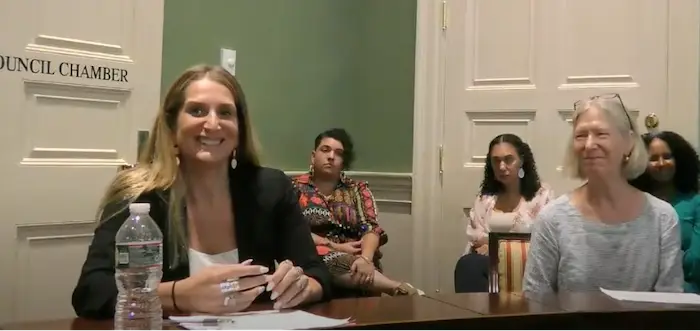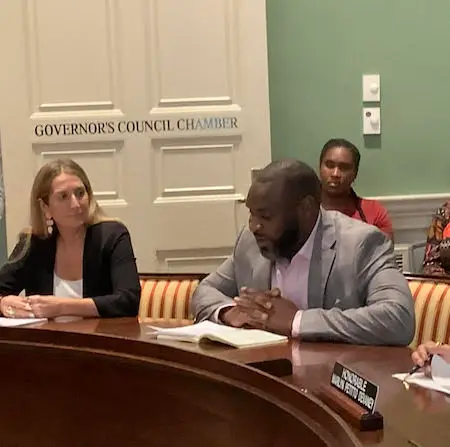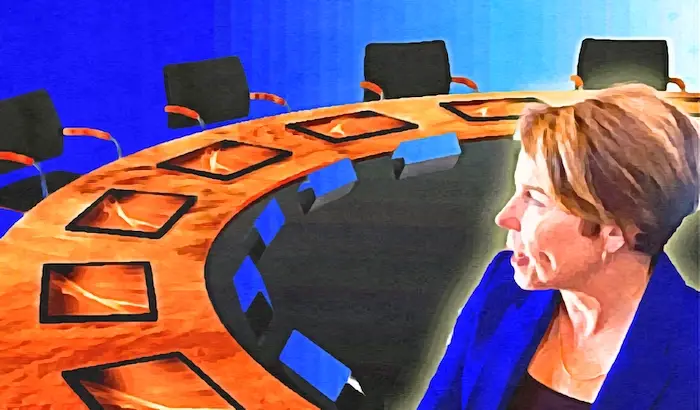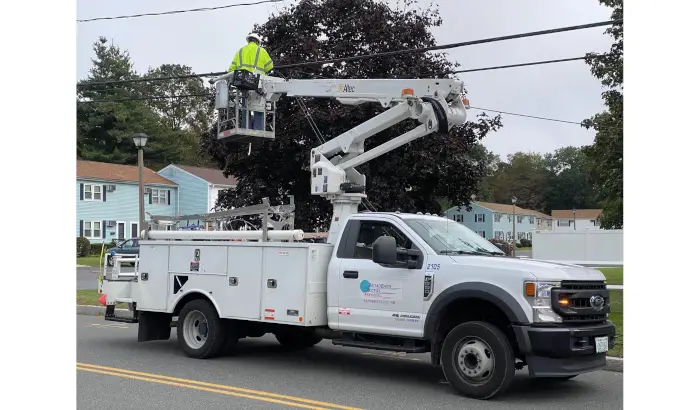“I know that if Sarah Coughlin is appointed to the Parole Board, she will be the people’s Parole Board member.”
On Aug. 31, Massachusetts Gov. Maura Healey nominated social justice advocate and social worker Sarah Coughlin to the state’s Parole Board, and stated in a press release that Coughlin shared “the administration’s commitment to making our criminal justice system more just and equitable for all.”
Coughlin is currently the director of community engagement and partnerships at Mass General Brigham, and has wide-ranging experience with incarcerated and formerly incarcerated men and women in re-entry, substance use disorder, trauma,and healing.
Coughlin’s nomination is only the second for Healey in her eight-plus months of governing the commonwealth. Her first nomination was also to the Parole Board, a re-nomination in June of forensic psychologist Dr. Charlene Bonner, who was originally appointed to the panel by Gov. Deval Patrick in 2011 and successfully renominated twice—in 2013, and 2019.
Activists like Lanny Kutakoff, former executive director of Partakers, an organization providing educational mentors for prisoners, think Coughlin’s nomination bodes well for future board picks. Reached for comment, Kutakoff told the Boston Institute for Nonprofit Journalism that “Healey seems to have better insight than past governors into what qualifications are important for the Board.”
A 2021 report by the Special Commission on Structural Racism in the Massachusetts Parole Process recommended that members have experience in fields of psychiatry, psychology, social work, or the treatment of substance-use disorder. They also “found a need for an individual who themselves has completed parole to preside on the Parole Board who can provide first-hand experience from the perspective of someone who has had successful re-entry.”
By the time Gov. Charlie Baker left office in January 2023, however, all his appointees except for Dr. Bonner—who has education, training, and experience in clinical psychology along with knowledge of substance use disorders—had been from law enforcement, law, parole or corrections backgrounds.

A beleaguered board
Kutakoff said some have criticized Gov. Healey for waiting so long to issue nominations to an overworked four-member Parole Board. Three seats have been vacant—two, for the entire eight-plus months of her tenure—until this nomination. A letter sent to Healey in August, signed by 23 groups and a number of individuals, urged her to fill empty seats as soon as possible (full disclosure, this reporter is a member of one of those groups). Healey has not yet nominated any judges or other court personnel either, although there are a number of judicial vacancies.
According to their website, the Parole Board’s “mission is to promote public safety through supervised, conditional release of [prisoners] to the community.” In other words, the panel is responsible for judging if men and women have done the work behind bars to warrant release under supervision as they complete their sentence in the free world.
Healey has touted her commitment to the criminal legal system through her pardoning of 11 individuals (i.e. forgiving the underlying offenses that led to sentencing), and is the first governor in three decades to do so in their first year in office. “When we recommended our first round of [seven] pardons earlier this year, I said that we were doing it because justice can’t wait,” the governor said in a media statement. “This second round [of four] reflects our continued commitment to that principle.”
At Bonner’s hearing in June, Chair Tina Hurley described the work of the Parole Board and how stretched it has been with a mere four members. Each travels to state and county institutions throughout the commonwealth—in 2021, they held 2,578 institutional hearings and sat twice a week in full board hearings, judging the readiness of 269 second-degree lifers. Under Hurley’s leadership, the body has also been holding termination hearings for those seeking to end lifetime parole, conducted pardon and commutation hearings which had been slowed almost to a halt under past chairs, “done a ton of administrative work,” and still issued decisions in less than three months for those with life sentences seeking parole. The previous board, under former Chair Gloriann Moroney, which usually had seven members during her years as chief, took nine to 11 months to issue such decisions.
Hurley said that she believed having more members would help the beleaguered board. A bill currently filed by Rep. Lindsay Sabadosa (along with the same legislation in the state Senate, filed by Sen. Liz Miranda) would increase Parole Board membership to nine.
The Coughlin hearing
Massachusetts, unlike many other states, requires that all gubernatorial nominations—i.e. judges, Parole Board members, and other court personnel, as well as those recommended for pardons and commutations—be approved by the Governor’s Council. The Council, which dates back to Colonial times has a checkered history. Councilors are elected to two-year terms by voters from across the state—one for each of the body’s massive eight designated districts—and paid $36,000 a year. It currently consists of seven members with one vacant seat.
Coughlin’s colleagues and clients packed the room at her Sept. 13 nomination hearing. In her testimony, the advocate said, “Social work is not just what I do, it’s who I am,” and went on to explain that she “seeks to understand a person’s behavior in light of where that person lives.”

Armand Coleman, executive director of the Transformational Prison Project (TPP), an organization founded by and for incarcerated and formerly-incarcerated people, was one of several who testified for Coughlin. Coughlin joined TPP, becoming director of its Center for Wellness and Restoration. Coleman praised her work, saying that if he had been helped by her, he might never have gone to prison. He added, “I know that if Sarah Coughlin is appointed to the Parole Board, she will be the people’s Parole Board member.”
Councilor Christopher Iannella, who practices insurance law, chaired Coughlin’s proceedings, as hearings are run by the councilor who represents the district where the nominee resides. Iannella picked up on the concern from testimony that the governor had not yet filled Parole Board seats, and surprised the room by questioning Paige Scott Reed, Gov. Healey’s chief legal counsel. He asked if she might send another nominee to the body within 30 days. Reed did not commit to a timeline but said, “I’m determined that we’re going to fill the seats with individuals like Sarah Coughlin who understand the lived experience of the people who are coming before the Parole Board and who understand the science of what works and what doesn’t work.” She added, “This board is as important to me as anything I’ve been asked to do.”
Councilor Paul DePalo, an attorney who represents 65 cities and towns in Central Mass, stated he was “heartened,” in spite of wishing seats were being filled more quickly. “We got it right today,” he said, “and we’re going to get it right two more times.”
Councilors will vote on Coughlin’s nomination on Sept. 20, 2023.





